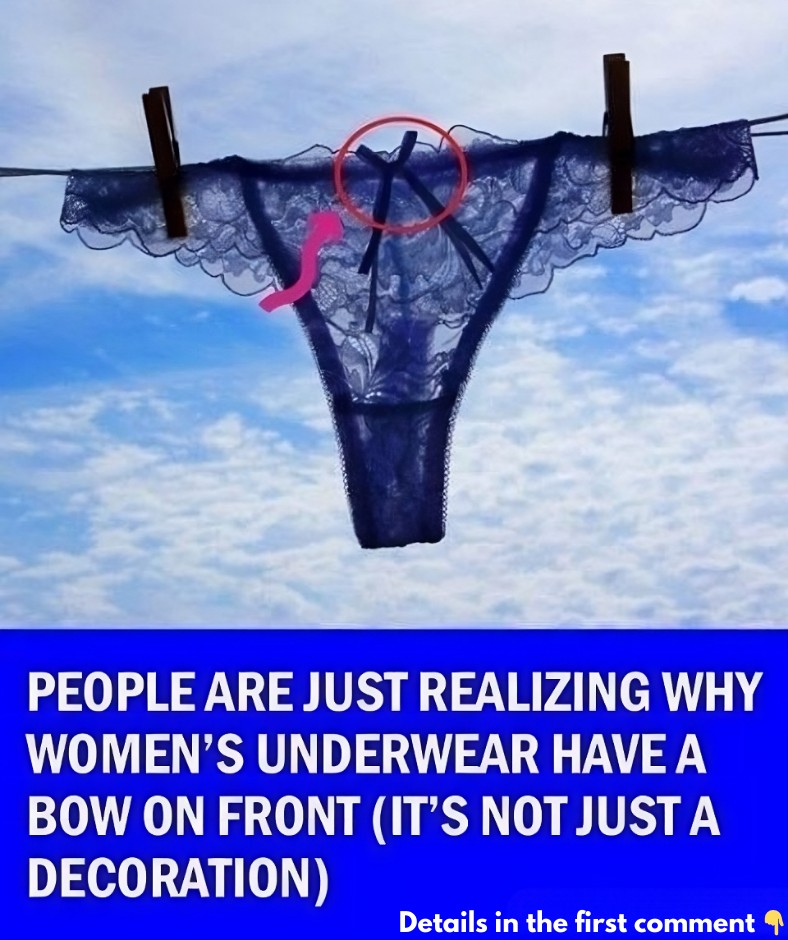Have you ever noticed the small bow on the front of women’s underwear and stopped to think about its purpose? While it may seem like a simple decorative detail, this tiny feature has a rich history rooted in practicality. Today, it stands as a symbol of femininity and charm, but its origins are far more utilitarian. Let’s dive into the story of how this humble bow evolved from a functional necessity to an enduring fashion statement.

Before Elastic: The Bow’s Functional Beginnings
Before the invention of elastic, undergarments required a different method to stay securely in place. In those earlier days, stretchy waistbands were not an option. Instead, women used drawstrings threaded through lace eyelets to fasten their undergarments.
These drawstrings were tied in a bow at the front, which served two purposes. First, the bow ensured that the garment fit snugly around the waist, preventing it from slipping. Second, it acted as a convenient way to distinguish the front of the underwear from the back—a useful feature when dressing in dim lighting or a hurry.
Over time, as fashion evolved and elastic became widely available in the 19th century, the practical need for drawstrings disappeared. Yet, the bow remained. Why? Its aesthetic appeal and nostalgic charm helped it transition from a functional element to a decorative one, forever securing its place in fashion history.
Why the Bow Survived the Arrival of Elastic
With elastic revolutionizing undergarment design, one might assume the bow would fade into obscurity. Instead, it became a staple design feature. This shift was driven by tradition and the bow’s association with elegance and femininity.
What had once been a practical necessity was now seen as a decorative embellishment. Designers retained the bow as a way to infuse charm and softness into their creations. It became a symbol of femininity, adding a delicate touch to an item often hidden beneath clothing.
Today, the bow remains an iconic feature of women’s underwear, appreciated not only for its nostalgic value but also for its ability to make everyday items feel just a little more special.
The Bow as a Symbol of Femininity and Grace
In modern times, the bow on women’s underwear is much more than a relic of the past—it’s a symbol of femininity and elegance. For many women, it represents a touch of playfulness and charm, transforming a practical garment into something that feels unique and beautiful.
The bow evokes a sense of softness and innocence, qualities that resonate deeply with its wearers. Discussions on forums like Reddit reveal that people often find the bow both aesthetically pleasing and subtly practical. Even in its modern, decorative form, the bow can help quickly identify the front of the garment—a small but appreciated detail for those busy mornings.
A Brief History of Women’s Undergarments
To fully understand the bow’s lasting appeal, it’s helpful to take a closer look at the evolution of women’s underwear. Before the 19th century, undergarments as we know them were practically nonexistent. Women typically wore layers of clothing such as petticoats, chemises, and corsets.
The 1800s marked a turning point, as dedicated undergarments like drawers and pantalettes became popular. These early designs often featured drawstrings tied in a bow at the front, reflecting the practicality of the era. As elastic became a standard material, the bow transitioned from a functional element to a decorative one.
This historical shift highlights how even the simplest design features can endure, carrying with them a legacy of craftsmanship and creativity.
The Bow’s Enduring Charm
Despite changes in fashion trends, including the rise of minimalist designs, the bow on women’s underwear has stood the test of time. Designers continue to include it because of the charm and nostalgia it brings. It serves as a link to the past, a reminder of a time when practicality and beauty were seamlessly integrated into women’s clothing.
Even today, the bow serves a minor yet practical purpose. It helps distinguish the front of the garment from the back—a small but handy feature that many appreciate in a fast-paced world. Its dual role as both a decorative and functional element ensures that the bow remains relevant in modern design.
A Lasting Touch of Femininity
The bow on women’s underwear isn’t just a pretty embellishment. It’s a testament to the enduring nature of thoughtful design. From its origins as a functional drawstring to its status as a decorative symbol, the bow has evolved alongside women’s fashion, blending practicality with beauty.
While today’s underwear no longer relies on bows for support, this small detail continues to add elegance to an everyday garment. It reminds us that even the smallest features can carry rich histories and meaningful stories.
Conclusion: A Timeless Legacy
At first glance, the tiny bow on women’s underwear might appear insignificant, but it carries a fascinating legacy of practicality, tradition, and fashion evolution. From its early days as a functional fastening method to its modern role as a decorative feature, the bow has remained a beloved symbol of femininity.
The next time you notice that delicate bow on your underwear, think of its journey. It’s more than just a decoration—it’s a connection to the past, a nod to the creativity and resourcefulness of earlier generations, and a timeless celebration of charm and grace.





